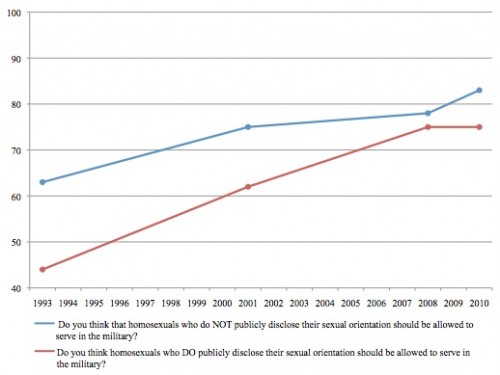Brian McCabe put up a post at Five Thirty Eight about changes in public attitudes toward letting gays and lesbians serve in the U.S. military, using data from ABC/Washington Post polls that asked whether gays and lesbians should be able to serve and whether they should be allowed to serve while openly disclosing their sexual orientation.
The red line below indicates those who said gays and lesbians who are open about their sexual orientation should be allowed to serve. The blue line indicates responses for those who agreed that gays and lesbians should be able to serve if they didn’t disclose their sexual orientation — a position that basically aligns with the military’s current Don’t Ask, Don’t Tell policy.
When DADT was passed in 1993, less than half of those surveyed thought gays and lesbians should be able to openly serve, though over 60% supported allowing them to serve as long as they didn’t disclose their sexual orientation. But notice the dramatic changes in the last 17 years:
Support among the general public for allowing gays and lesbians to serve in the military, without any restrictions, has increased greatly. In 2008, 75% of respondents supported such a policy. Also notice the gap between the two options has narrowed. In the 1990s, a significant portion of the population was comfortable with gays and lesbians in the military only under a DADT-type situation, where anyone who wasn’t straight had to keep quiet about it. Today the overwhelming majority of respondents support a non-restrictive policy, and the additional support gained by adding the possibility of requiring gays and lesbians to hide their sexual orientation isn’t nearly as large as it used to be.
Whether Congress will repeal DADT is still unclear. But the trend among the general public is pretty clear, from this and other polls: Americans no longer need the reassurance of a policy that promises to restrict gays’ and lesbians’ sexuality in order to support their military service.


Comments 8
SamR — December 2, 2010
Given the militarys puritanical policies (like regulating sex to the point of only authorizing missionary style sex) I wonder what their take will be on showers, bathroom facilities, and housing.
Jazz — December 2, 2010
I had no idea until I googled this but Australia went through a similar thing in the 90s. Except that instead of pandering to the bigots, the govt ju7st went ahead and changed policy to be inclusive. And guess what, nothing bad happened, and nobody is whining about it now. Amazing.
libractivist — December 2, 2010
What I find interesting is that between 2008 and 2010, when a lot of the DADT debates have been going on, the acceptance rate of closeted gay servicemembers went up while the acceptance rate for openly gay servicemembers stagnated. It's probably a stretch to try to argue anything from these limited datapoints, but I'm wondering if that's a trend that's at all meaningful (and if so, what it might mean!)?
Ames — December 3, 2010
In addition to the obvious consequences we always hear about, DADT has had various insidious results. It has been reported that women in the military who have been sexually assaulted have said that they were afraid to report the assault because they believed that they would be accused of being lesbians. So to compound the horrific state of sexual assault in the military, how many assaults take place because the attacker knows the victim will stay silent because of DADT? When anyone is asked whether DADT is a good idea, do you think they bother to wonder about all the less-obvious results of the policy?
Mira — December 3, 2010
That graph REALLY bugs me. The two lines represent questions, not answers! *Twitches*
T — December 5, 2010
Other than the obvious, a major problem I have with DADT is that it *requires* our servicemen to be UNETHICAL. They are asked to lie and be secretive. This is at odds with (or at least I hope it's at odds with) what the U.S. Armed Forces stands for...